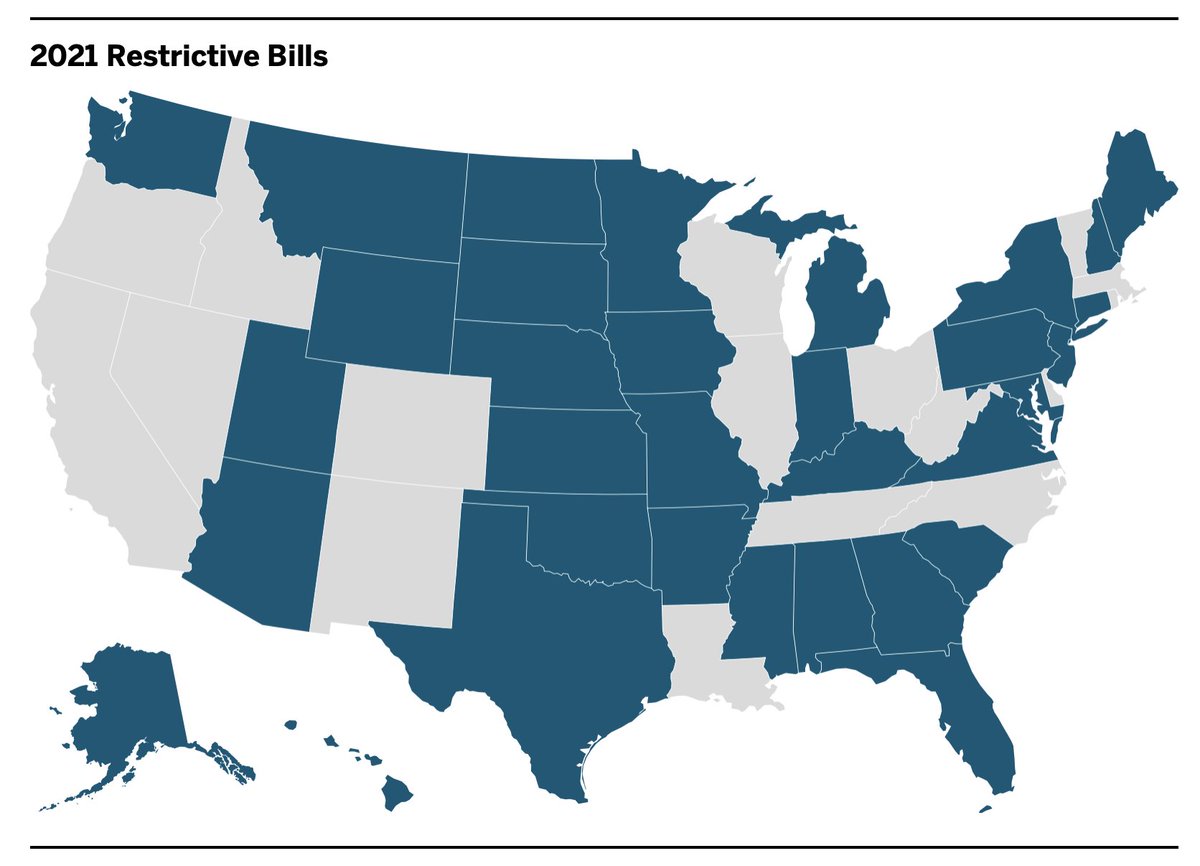”We are now potentially dealing with a problem of *mass radicalization*. We’re not talking about the case of a few people that got themselves caught up in an extremist milieu and then radicalized. We’re potentially talking about millions of people.” https://www.npr.org/2021/02/08/964537232/how-the-fbi-is-responding-to-the-rise-in-home-grown-extremism
One response to this tweet a few days ago was to dismiss the idea of ”mass radicalization.” Yes, it’s unlikely millions of citizens are going to engage in violent insurrection against the US. That definition is too narrow, though. Radicalization isn’t just about violence.
In any movement, people who commit violence will tend be a small percentage of the group. That in no way precludes millions from sharing a radical ideology, endorsing violent tactics, using violent rhetoric, dehumanizing outgroups and working to undermine democratic institutions.
When a mainstream organization engages in radical behavior, it can be hard to reconcile the conflicting signals. The GOP is the second-oldest surviving party in the US. From statehouses to the ex-President, the GOP, is also increasingly opposed to core democratic principles.
. @ThePlumLineGS makes the case clearly. ”Trump’s acquittal only confirms what many observers had long pointed out: In some fundamental sense, much of the GOP is no longer functioning as an actor in a democracy.” https://www.washingtonpost.com/opinions/2021/02/13/massive-gop-betrayal-our-democracy-requires-forceful-democratic-response/
. @NormOrnstein & Mann: ”GOP has become an insurgent outlier in US politics. It is ideologically extreme; scornful of compromise; unmoved by conventional understanding of facts, evidence & science; dismissive of the legitimacy of its political opposition.” https://www.washingtonpost.com/opinions/2021/02/13/massive-gop-betrayal-our-democracy-requires-forceful-democratic-response/
Levitsky & Ziblatt ”lay out a four-part test for identifying authoritarian leaders: rejecting democratic institutions, denying legitimacy of political opponents, tolerating or encouraging violence and curtailing civil liberties.” US now easily at 3 of 4. https://bookshop.org/books/how-democracies-die/9781524762940
Militant partisans on both left and right endorse violence. That doesn’t mean it’s symmetrical. Among GOP, ”9% said military should overthrow new president; 25% said citizens should prepare weapons to resist the federal government.” https://www.washingtonpost.com/politics/2021/01/11/what-you-need-know-about-how-many-americans-condone-political-violence-why/
What’s important about the idea of ”mass radicalization” is not extremists endorsing violence. Democratic governments can be overthrown both by insurrection and legally from within. Yes, political violence is serious but the bigger threat is the coup attempts that are bloodless.
From 2014: ”Political scientists have known for years that political polarization is largely a one-sided phenomenon: in recent decades the Republican Party has moved to the right much faster than Democrats have moved to the left.” https://www.washingtonpost.com/news/wonk/wp/2015/06/02/this-astonishing-chart-shows-how-republicans-are-an-endangered-species/
An analysis in 2019 looked at documents that lay out a group’s goals & policy ideas. They found ”The GOP leans much farther right than most traditional conservative parties in Western Europe & Canada, according to an analysis of their election manifestos.” https://www.nytimes.com/interactive/2019/06/26/opinion/sunday/republican-platform-far-right.html
”In a backlash to historic voter turnout, and grounded in a rash of baseless and racist allegations of voter fraud, legislators have introduced well over four times the number of bills to restrict voting access as compared to roughly this time last year.” https://www.brennancenter.org/our-work/research-reports/voting-laws-roundup-2021-0
”Thirty-three states have introduced, prefiled, or carried over 165 restrictive bills this year (as compared to 35 such bills in fifteen states on February 3, 2020).” https://www.brennancenter.org/our-work/research-reports/voting-laws-roundup-2021-0
A new Voting Rights Act would bolster US democracy but, “If filibuster remains in place, HR 1 dies in Senate.” So, HR1 hangs in balance of Manchin and Sinema’s opposition to ending filibuster. Where’s the pro-democracy movement to help get them on board? https://www.theatlantic.com/politics/archive/2021/02/democrats-need-hr-1-and-new-vra-protect-party/617987/
Anti-democratic forces in US are strong but cross-national studies show pro-democracy movements can be a powerful check. Could a broad coalition, from activists to donors, mobilize enough pressure to advance voting rights? See @andrewmarantz’s sage piece: https://www.newyorker.com/magazine/2020/11/23/how-to-stop-a-power-grab

 Read on Twitter
Read on Twitter



